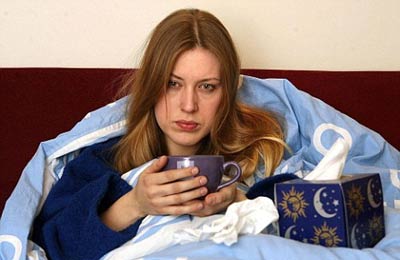|
 Sick... of your job? Boredom and depression at work prompted almost two-thirds claim they are unwell because they are disillusioned with their career. |
|
One in three workers admit to taking time off under false pretences, according to research. Good weather, hangovers and romantic trysts motivated some staff to lie about absences, the study found. Boredom and depression at work prompted almost two-thirds to call in sick because they are disillusioned with their jobs. Some of the excuses reported were: ‘I fell out of the loft’ and ‘I was beaten up by a bouncer’. Pet problems were frequently cited with dog-related illnesses most common. Illness is the favoured excuse with four out of ten absentees faking symptoms or using props such as crutches and make-up in preparation for a day off. Half of all health-related excuses involve stomach upsets, which are hard to disprove. Absenteeism costs British businesses around £32billion a year, according to a study of 2,000 firms by accountants PwC. British skivers take twice as many days off as their counterparts in America. Workers between 18 and 34 years old are more prone to phoning in sick than their older colleagues. But PwC’s Nick Roden said coping with the pressures of family life was an important factor in many sick days. He added: ‘For 21 percent of workers, family responsibilities are the real reason behind sick days, perhaps highlighting the difficulties staff face achieving a work-life balance.’ (Read by Renee Haines. Renee Haines is a journalist at the China Daily Website.) (Agencies) |
研究显示,英国三分之一的员工承认他们请假是造假。 这项研究发现,宜人的天气、畅饮后的宿醉以及浪漫的约会,都会促使员工编造假理由,不去上班。 近三分之二的人打电话请病假是因为他们对自己的工作非常失望,觉得工作太单调沉闷了。 研究中还列举了一些请假的理由,如“我从阁楼上摔下来了”和“我被一个大汉揍了一顿”。 宠物也常被用来做请假的理由,其中小狗生病的理由最为常见。 人们最爱用的理由还是生病。为了请一天假,四成的人会装出有病的样子,借用拐杖之类的道具或是化个妆。 请病假的理由中,一半都是肠胃不舒服,很难辨明真伪。 普华永道会计师事务所调查了2000家公司之后发现,翘班每年给英国企业造成320亿英镑左右的损失。 而英国翘班族请假的时间是美国人的两倍。 和年长的员工相比,18岁至34岁的员工更爱打电话请病假。 不过普华永道的尼克•罗登说,来自家庭生活的压力是很多员工请病假的重要原因。 他还说,“21%的员工请病假背后的真正原因是照顾家庭,这也凸显了员工在工作与家庭之间保持平衡的不易。” 相关阅读 (中国日报网英语点津 实习生高美 编辑:陈丹妮) |
|
Vocabulary: hangover: the headache and sick feeling that you have the day after drinking too much alcohol 宿醉(过量喝酒后第二天的头痛以及恶心反应) tryst: a secret meeting between lovers (情人的)约会,幽会 call in sick: 打电话请病假 loft: a space just below the roof of a house, often used for storing things and sometimes made into a room 阁楼,顶楼(常用以贮物,间或作房间) bouncer: 壮汉 absentee: a person who is not at a place where they were expected to be(缺席者;缺勤者;缺课者) prop: a small object used by actors during the performance of a play or in a film/movie(道具) disprove: to show that something is wrong or false 证明……是错误(或虚假)的 absenteeism: the fact of being frequently away from work or school, especially without good reasons (经常性无故的)旷工,旷课 skiver: 躲避工作的人 |
